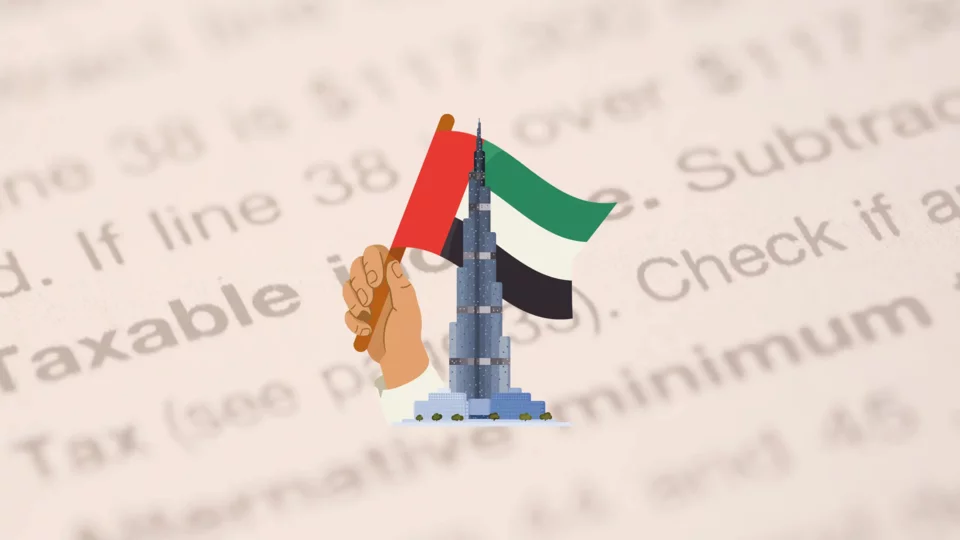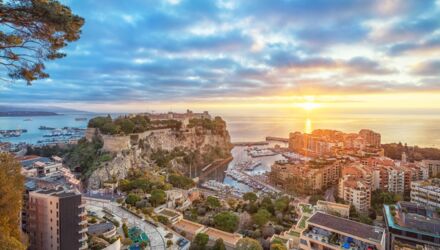
Publié par Paolo Petrini le 22/09/2025

In 2025, Dubai's tax model will change: a federal tax of 9% already applies to profits exceeding AED 375,000, a minimum rate of 15% will come into force for multinationals in accordance with OECD rules, and VAT set at 5% could increase in the medium term. These measures mark a break with the image of an absolute fiscal Eldorado.
Dubai has long attracted entrepreneurs and expatriates thanks to the absence of income tax and almost zero taxation for companies. Since June 2023, companies exceeding the AED 375,000 (€≈94,000) threshold are subject to a rate of 9%. From January 2025, Cabinet Decision No. 142 of 2024 will introduce a minimum of 15% for groups with a turnover of more than €750 million, within the framework of the OECD. At the same time, VAT, introduced in 2018 at 5%, remains one of the lowest in the world, but the increase observed in neighbouring countries (15% in Saudi Arabia, 10% in Bahrain) is fuelling speculation. This new tax context is encouraging more and more investors to consider more stable alternatives such as Monaco.
Dubai has long established itself as a tax Eldorado, with no income tax and almost no corporate taxation. This environment has attracted thousands of entrepreneurs and wealthy expats. But the situation is changing. Since June 2023, the UAE Ministry of Finance has confirmed the application of a 9% federal tax on corporate profits above AED 375,000 (approximately €94,000). And from 2025, Cabinet Decision No. 142 of 2024, published by the ministry, will introduce a minimum rate of 15% for large multinational groups under OECD rules. VAT has remained at 5% since 2018, according to the Emirati authorities, but the regional context is worrying: Saudi Arabia has raised it to 15% and Bahrain to 10%, leaving the hypothesis of an increase in the medium term.
These signals show that the Gulf's fiscal model is moving towards greater normalization, even as other challenges such as the increasingly extreme climate and persistent regional instability are added. We have already published a comprehensive comparison between Monaco and Dubai that highlights the Principality's strengths. Here, it is enough to remember that Monaco is a safer alternative, with clear taxation, proven stability and a real estate market recognized as a safe investment.
As mentioned in the introduction, the 9% federal tax on profits exceeding AED 375,000 (€≈94,000) is now a reality in the UAE, confirmed by the UAE Ministry of Finance and the French Treasury. But beyond the announcement, this change deserves a more detailed reading.
First, it profoundly changes the logic of Dubai's attractiveness. SMEs and local entrepreneurs remain partially protected by the exemption threshold, but international companies and investor groups must now integrate this cost into their strategy. Free zones, historically used by many expatriates to benefit from tax advantages, no longer automatically guarantee exemption: only certain "qualifying" activities retain relief, according to the criteria defined by the Ministry of Finance.
Then, the timetable accelerates. As of January 2025, Cabinet Decision No. 142 of 2024, published by the ministry, will introduce a minimum rate of 15% for large multinationals exceeding €750 million in consolidated turnover, in accordance with OECD rules (Pillar Two). DLA Piper stresses that this measure aims to bring the UAE in line with international standards and limit the erosion of the tax base.
In practice, these developments are particularly disturbing:
International companies that came to set up in Dubai to avoid taxation elsewhere.
UHNW entrepreneurs who used local structures to manage their shareholdings.
Some investment funds and holding companies, which have to rethink their tax optimisation.
This shift is less painful for small players, but it sends a strong signal: Dubai is no longer an "absolute tax haven" and is now part of a global movement towards normalisation. For profiles with very high net worth, this loss of competitive differential reduces the advantage of choosing Dubai compared to other established places such as Monaco, where taxation remains clear, stable and oriented towards wealth protection.
Another major change in the UAE tax landscape is the introduction in 2018 of a 5% value-added tax (VAT), confirmed by the French Treasury. Dubai, which once had no consumption tax, has joined its Gulf neighbours in the implementation of indirect taxation. Since then, the regional trend has been clear: Saudi Arabia increased its VAT to 15% in 2020 and Bahrain to 10% in 2022, according to the same sources. The Emirates remain at 5% for the time being, one of the lowest rates in the world, but many are wondering: until when?
According to a report by S&P Global, an increase towards 10% is envisaged in the medium term in several Gulf countries in order to significantly increase government revenues. The Emirati authorities, for their part, have repeatedly reiterated that no imminent increase was planned, even stressing a few years ago that VAT should not change "in the next five years".
In practice, this status quo of 5% reassures local consumers for the time being, whose cost of living remains relatively controlled compared to the region. But a possible increase would weigh directly on the purchasing power of expatriates and on high-income households, which spend a lot on real estate, luxury goods and premium services. International companies established in the Emirates, particularly in trade and retail, would also be impacted by a contraction in domestic demand.
VAT therefore remains an underused tax lever for Dubai. If regional fiscal balances become tighter, it is likely that the UAE will be forced to follow the trend of its neighbours. For wealthy investors, this type of indirect taxation may seem secondary, but it contributes to eroding the image of the absolute fiscal Eldorado.
Dubai's main tax advantage, in the eyes of expats and UHNWs, remains the total absence of personal income tax. To this day, residents remain fully exempt on their salaries, dividends and personal income, a considerable advantage for wealthy individuals, as Village Justice and the Khaleej Times recall.
In the face of recurring rumours, the UAE government reaffirmed in 2024 that no plans for a personal income tax were being considered, a statement intended to reassure the expatriate community. But the region is evolving. For the first time, a Gulf country is taking the plunge: Oman has announced the introduction in 2025 of a progressive tax on high incomes, with rates ranging from 5% to 9% above about $100,000 annually, according to the Khaleej Times.
This decision could serve as a regional precedent. While Dubai officially excludes any taxation of individuals, the trend is towards tax diversification in the Gulf. This is of particular concern:
UHNW expats, who came precisely to protect their income.
Business leaders and private investors, who could see their mobility reduced if a tax were introduced.
Wealthy families, sensitive to long-term tax security.
As it stands, Dubai retains this unique competitive advantage, but the gradual erosion of its other tax advantages (corporate tax, potentially increasing VAT) weakens its image as an absolute tax haven. For international investors, this accentuates interest in stable and sustainable destinations such as Monaco, where the absence of income tax has remained an immovable pillar for more than a century. For this reason, our Petrini Exclusive Real Estate Monaco agency receives many requests on how to become a Monegasque resident, to which we respond with our complete guides that explain the administrative procedures to be carried out.
Faced with Dubai's growing tax system, Monaco appears more than ever to be an alternative of choice for those looking for an environment that is both tax-efficient and ultra-secure. This micro-state, although famous for the price of real estate, offers one of the most attractive tax frameworks in the world. Monaco remains one of the few countries to levy no tax on residents' income, wealth tax, property tax or capital gains tax. This absence of direct taxation on individuals (in force since 1869) is a major asset for wealthy individuals and international entrepreneurs.
In addition, Monaco offers exceptional political and economic stability, thanks to the policy of H.S.H. Prince Albert II, as well as first-rate public security. The Monegasque real estate market, although it is the most expensive in the world (with an average price exceeding €52,000 per m²), is also considered to be one of the safest and most resilient. Real estate here increases in value over the long term, driven by constant demand and a very limited number of available properties. In short, investing in Monaco means opting for a long-term investment in an ultra-exclusive market, while benefiting from a stable tax environment and an unrivalled lifestyle.
Monaco's assets in a nutshell :
Ultra-advantageous taxation – No income tax for residents, nor taxes on capital or capital gains.
Luxury real estate market – The most expensive in the world, but offering investment security and stable returns over time.
Exclusive living environment – Political stability, maximum security, Mediterranean climate, luxury infrastructure and social events make Monaco an unparalleled place to live.
In short, Dubai is seeing its tax haven gradually erode under the effect of new taxes. Although the emirate retains undeniable attractions, the introduction of corporate tax and the prospect of increased taxation (increased VAT, possible future taxes) make the situation less exceptional than before. For investors and expatriates looking for long-term tax stability, it may be wise to broaden horizons.
Monaco was therefore a refuge of choice: this stable rock offered continuity in terms of tax advantages, security and prestige. If you are thinking of repositioning your residence or your real estate investments, Monaco has solid assets to showcase. Our Monegasque real estate agency has a wide selection of luxury properties for sale and rent, and we are ready to assist you in your project of settling in the Principality. By choosing Monaco, you are opting for security, tax serenity and an incomparable art of living – a winning bet for the future.
Sources: The information presented is based on data published by official economic sources and specialized media, including the French Treasury Department, the Khaleej Times, as well as analyses by Bloomberg and S&P Global, among other things, in order to guarantee the accuracy of the facts mentioned.
Discover this sumptuous 4-room apartment completely renovated, located in the Riviera Palace. Offering a breathtaking view of the Casino de Monte-Carlo and the sea, it combines contemporary elegance, top-of-the-range services and an exceptional location in the heart of Monaco.
14 900 000 €
Discover this splendid 3-room apartment in bourgeois style, completely renovated with exceptional materials. Located a stone's throw from the Place des Moulins, in a charming residence, it combines classic elegance and modern comfort in the heart of Monaco.
3 800 000 €
Close to the Port and the new train station. We offer you this very quiet apartment, located in a luxurious residence. The undeniable asset of this property is undoubtedly its fenced private garden. This studio is rented fully furnished.
3 200 €


Contact our real estate agency in Monaco
In which district would you like to search for your future apartment?